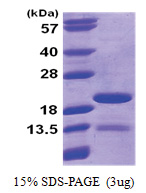PIN4 (1-156, His-tag) Human Protein
Other products for "PIN4"
Specifications
| Product Data | |
| Species | Human |
| Expression Host | E. coli |
| Expression cDNA Clone or AA Sequence |
MGSSHHHHHH SSGLVPRGSH MPMAGLLKGL VRQLERFSVQ QQASKMPPKG KSGSGKAGKG GAASGSDSAD KKAQGPKGGG NAVKVRHILC EKHGKIMEAM EKLKSGMRFN EVAAQYSEDK ARQGGDLGWM TRGSMVGPFQ EAAFALPVSG MDKPVFTDPP VKTKFGYHII MVEGRK
|
| Tag | His-tag |
| Predicted MW | 18.8 kDa |
| Concentration | lot specific |
| Purity | >85% |
| Presentation | Purified |
| Buffer | Presentation State: Purified State: Liquid purified protein Buffer System: 20 mM Tris-HCl buffer (pH 8.0) containing 10% glyceril 1mM, DTT, 0.1 mM PMSF |
| Bioactivity | Specific: > 300 nmoles/min/mg, defined as the amount of enzyme that cleaves 1 umole of suc-AAPF-pNA per minute at 25°C in Tris-HCl pH 8.0 using chymotrypsin. |
| Preparation | Liquid purified protein |
| Applications | Protocol: Activity Assay 1. Prepare 170 ul assay buffer into a suitable container and pre-chill on ice before use: The final concentrations are 200 mM Tris-HCl, pH 8.0, and 20 nM chymotrypsin. 2. Add 10 ul of recombinant PIN4 protein with 1 ug in assay buffer. 3. Mix by inversion and equilibrate to 1°C and monitor the A405nm until the value is constant using a spectrophotometer. 4. Add 20 ul pre-chilled 5 mM suc-AAFP-pNA. (Substrate was dissolved in TFE that contained 460 mM LiCl to a concentration of 3 mM) 5. Record the increase in A405 nm for 30 minutes at 25°C. |
| Protein Description | Recombinant human PIN4 protein, fused to His-tag at N-terminus, was expressed in E.coli and purified by using conventional chromatography. |
| Storage | Store undiluted at 2-8°C for up to two weeks or (in aliquots) at -20°C or -70°C for longer. Avoid repeated freezing and thawing. |
| Stability | Shelf life: one year from despatch. |
| Reference Data | |
| RefSeq | NP_001164218 |
| Locus ID | 5303 |
| UniProt ID | Q9Y237 |
| Cytogenetics | Xq13.1 |
| Synonyms | EPVH; PAR14; PAR17 |
| Summary | This gene encodes a member of the parvulin subfamily of the peptidyl-prolyl cis/trans isomerase protein family. The encoded protein catalyzes the isomerization of peptidylprolyl bonds, and may play a role in the cell cycle, chromatin remodeling, and/or ribosome biogenesis. The encoded protein may play an additional role in the mitochondria. [provided by RefSeq, Dec 2009] |
Documents
| FAQs |
| SDS |
Resources
Recombinant Protein Resources |
{0} Product Review(s)
0 Product Review(s)
Submit review
Be the first one to submit a review
Product Citations
*Delivery time may vary from web posted schedule. Occasional delays may occur due to unforeseen
complexities in the preparation of your product. International customers may expect an additional 1-2 weeks
in shipping.






























































































































































































































































 Germany
Germany
 Japan
Japan
 United Kingdom
United Kingdom
 China
China
